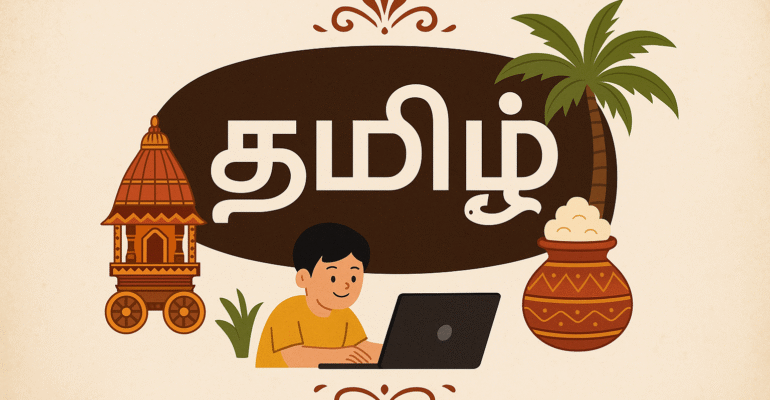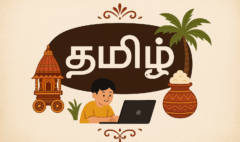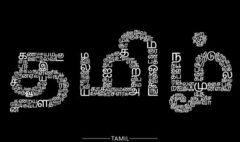The Role of Tamil in the Indian Independence Movement
The Role of Tamil in the Indian Independence Movement
The Role of Tamil in the Indian Independence Movement: A Language of Freedom
The story of the Indian Independence Movement is a vast and epic saga, a story of immense sacrifice, unwavering courage, and the powerful awakening of a national consciousness. While the history is often told through the lens of the major political events and national leaders, it is crucial to remember that this was a movement that was fueled by the passions and the voices of people from every corner of the subcontinent. In this grand narrative, the Tamil language played a profound and powerful role. It was not just a medium for communication; it was a fiery instrument of revolution, a vessel for nationalist poetry, and a powerful tool for mobilizing the masses. The relationship between the Tamil language and history is a deep and inseparable one, and nowhere is this more evident than in the story of our struggle for freedom.
For any student of Tamil and Indian history, understanding this role is essential. The speeches of the great Tamil freedom fighters and the patriotic songs that echoed through the streets were all delivered in the powerful and evocative cadences of Tamil. This guide will explore the pivotal role that the Tamil language played in the fight for independence, introducing you to the key figures and the essential historical terms in Tamil that defined this heroic era.
The Language of a Fiery Awakening: The Power of the Pen and the Podium
In the late 19th and early 20th centuries, as the desire for independence grew, the Tamil language became the primary vehicle for nationalist thought in the Madras Presidency. A new generation of writers, poets, and orators used the language to awaken the political consciousness of the Tamil people.
Subramania Bharati (சுப்பிரமணிய பாரதி): The Poet of the Revolution
It is impossible to talk about the role of Tamil in the independence movement without starting with the towering figure of Mahakavi Subramania Bharati. He was more than just a poet; he was a visionary and a revolutionary who single-handedly reshaped the Tamil language into a modern, powerful tool for social and political change.
- A New Poetic Language: Before Bharati, the language of Tamil poetry was often highly classical and inaccessible to the common person. Bharati wrote in a simple, direct, and incredibly powerful form of Tamil that could be understood and felt by everyone.
– Patriotic Fervor: His poems were filled with a burning passion for a free and unified India. Songs like “விடுதலை, விடுதலை, விடுதலை!” (Viṭutalai, viṭutalai, viṭutalai! – Freedom, freedom, freedom!) and “ஆடுவோமே பள்ளு பாடுவோமே” (Āṭuvōmē paḷḷu pāṭuvōmē – Let us dance and let us sing) became the anthems of the freedom struggle in the Tamil-speaking world. His words were sung at processions, taught to children, and shared in secret, becoming a powerful source of inspiration and unity.
– Social Reform: Bharati’s vision of freedom was not just about political independence. He also used his powerful Tamil poetry to fight against the injustices of the caste system and to champion the cause of women’s rights.
V. O. Chidambaram Pillai (வ. உ. சிதம்பரம் பிள்ளை): The Language of Economic Self-Reliance
V. O. C., affectionately known as “Kappalottiya Tamilan” (The Tamil who sailed ships), was another pivotal figure. His primary contribution was in the realm of economic nationalism.
- The Swadeshi Steam Navigation Company: V. O. C. challenged the monopoly of the British shipping companies by starting the first Indian-owned shipping company in 1906. His speeches, delivered in powerful and persuasive Tamil, were instrumental in convincing the local Tamil merchants and the public to invest in this Swadeshi (self-reliant) enterprise. He used the language to build a powerful case for economic independence as a crucial step towards political freedom.
The Language of the People: Journals and Public Speeches
The Tamil language was the medium through which the message of the freedom struggle was carried to every town and village.
- The Rise of Nationalist Journalism: Newspapers and journals published in Tamil, such as “Swadesamitran” and “India” (which was run by Bharati), were crucial in spreading the ideas of nationalism, self-rule, and Swadeshi to a mass audience. These publications became the intellectual battleground of the freedom movement in the south.
– The Power of the Spoken Word: The public speech was the most powerful tool for political mobilization. Leaders like S. Satyamurti and K. Kamaraj were masters of Tamil oratory, and their speeches could draw massive crowds and inspire them to action.
Essential Historical Terms in Tamil
To understand the literature and the speeches of this era, it is helpful to know some of the key historical vocabulary.
- Freedom / Independence – விடுதலை (Viṭutalai) or சுதந்திரம் (Cutantiram)
- Revolution – புரட்சி (Puraṭci)
- Movement / Struggle – இயக்கம் (Iyakkam) / போராட்டம் (Pōrāṭṭam)
- Freedom Fighter – சுதந்திரப் போராட்ட வீரர் (Cutantirap pōrāṭṭa vīrar)
- Nation / Country – நாடு (Nāṭu)
- Self-Rule – சுயராஜ்யம் (Cuyarājyam)
- Patriotism – நாட்டுப்பற்று (Nāṭṭuppaṟṟu)
- Slavery / Subjugation – அடிமைத்தனம் (Aṭimaittaṉam)
- Unity – ஒற்றுமை (Oṟṟumai)
- Sacrifice – தியாகம் (Tiyākam)
- “Long Live!” (a common slogan) – வாழ்க! (Vāḻka!) Example: “பாரத மாதா வாழ்க!” (Pārata mātā vāḻka!) – “Long live Mother India!”
Conclusion: A Legacy of Courage in Words
The story of the Tamil language and history is a story of resilience and power. During the Indian Independence Movement, the language was transformed. It was sharpened into a weapon against oppression, it was filled with the fire of patriotic poetry, and it became the voice of a people rising up to claim their destiny. The great Tamil freedom fighters were masters of the language, and they understood that the fight for freedom was also a fight for the freedom of their mother tongue and their unique cultural identity. For any student of Tamil and Indian history, an appreciation of this powerful role is essential. It is a reminder that words can indeed change the world.










